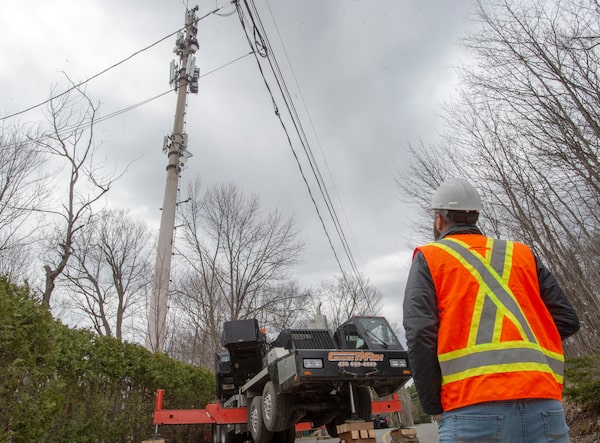
In the past week, at least four cell towers in Quebec - technicians seen here in Piedmont, Que on May 4, 2020 repairing a cell tower after a fire – have been set ablaze, incidents that follow dozens of acts of vandalism across Europe believed to be spurred by conspiracy theories.Ryan Remiorz/The Canadian Press
The Liberal chair of a parliamentary health committee is sponsoring an official petition to the House of Commons that is based on the premise that cellphone towers – and wireless technology – pose a danger to children.
The petition, which has been gathering signatures since late February, is also being promoted online by groups opposed to next-generation 5G mobile technology.
It is coming to light during a period of heightened anxiety over cellular technology in Canada, as there has been a spate of apparent acts of vandalism against cellphone towers recently. In the past week, at least four cell towers in Quebec have been set ablaze, incidents that follow dozens of acts of vandalism across Europe believed to be spurred by conspiracy theories.
The Commons standing committee on health is the main body for MPs to probe health matters, including Canada’s response to the COVID-19 pandemic. As chair, MP Ron McKinnon is responsible for helping steer its deliberations. The federal Liberal Party and government he belongs to has repeatedly emphasized a commitment to evidence-based decision-making.
Mr. McKinnon, MP for Coquitlam-Port Coquitlam in B.C.'s Lower Mainland, authorized petition E-2424 that asks for the government to set new restrictions on how close cellphone towers can be located to schools and playgrounds.
The committee chair defended his decision to sponsor the petition, saying some of his constituents were pushing for it.
Petitioners cannot directly present a petition to the House of Commons; only a member of Parliament can, according to the House website. MPs, however, are not required to authorize petitions that are brought to them. Neither Mr. McKinnon nor his office responded when asked about the possibility that he could have declined to authorize it.
The petition begins by citing a 2014 paper that discusses the risks that microwave radiation from wireless devices might cause cancer. The paper concludes the health “risk to children and adolescent from exposure to microwave radiating devices is considerable.”
But the study cited by the petition has faced heavy criticism.
Steven Salzberg, a professor of Biomedical Engineering, Computer Science and Biostatistics at Johns Hopkins University, said he read the paper about five years ago and, at that time, judged it “perhaps the worst scientific paper” he had encountered in years.
He said that while it purported to be a review of microwave radiation exposure in children, it’s not. It’s a series of claims, he said, where the authors have “cherry picked” studies that “they believe support their hypothesis … while ignoring hundreds of studies that contradict their claims."
Speaking of the petition, he said: “Attacking cell towers in a mistaken belief that they have health consequences is really misguided.”
Jonathan Jarry, a science communicator with McGill University’s Office for Science and Society, said that two of the study authors cited in the petition belong to a U.S. think tank "that believes 5G is toxic.”
5G technology is the next generation of mobile technology, which will require far more small cell sites – smaller versions of cell towers – to provide a dense web of coverage to deliver faster downloads and almost no lag time.
Mr. Jarry said there is a rich body of scientific literature on cellphone radiation and, among all of it, there is no good evidence that microwaves and radio signals harm people.
“When it comes to non-ionizing radiation, which is what we are talking about here, there are numerous major agencies who have looked at this entire literature and have issued position statements. Agencies like the World Health Organization, the Centers for Disease Control and the National Cancer Institute," he said.
“They all have come to the conclusion that there is no good scientific data showing any sort of detrimental health effects on humans from these types of signals.”
The McGill scientist said it’s dispiriting to learn of this petition, which was first reported by PressProgress, a left-leaning news site.
“If we want to hold our members of Parliament accountable for not basing their decisions on good, robust science, then this petition is particularly frustrating because it’s based on fear mongering, it’s based on long-disproved arguments and ultimately on bad science that really flies in the face of the scientific consensus on this issue.”
He added that anxiety about microwave and cellular technology is hardly new. “These concerns have always been with us from microwave ovens to cellphones – from 3G to 4G to 5G,” he said, listing different generations of mobile technology.
In a statement from his office, Mr. McKinnon said: “While I do not personally believe that cellphone towers pose a risk to human health, a number of my constituents have expressed interest in this petition and I wanted to ensure their views are heard.
"I’m confident the government will examine all relevant technical and health data in their response. I encourage all Canadians to follow the health advice from our scientists and public-health experts both locally and nationally.”
The Canadian Wireless Telecommunications Association, an industry group, expressed disappointment at the petition.
“While MPs have a role to play in presenting petitions on behalf of their constituents, it’s also important for MPs to base their decisions on evidenced-based research and science. This petition is based on neither, and relies solely on a discredited study,” the group said in a statement.
Know what is happening in the halls of power with the day’s top political headlines and commentary as selected by Globe editors (subscribers only). Sign up today.
 Steven Chase
Steven Chase